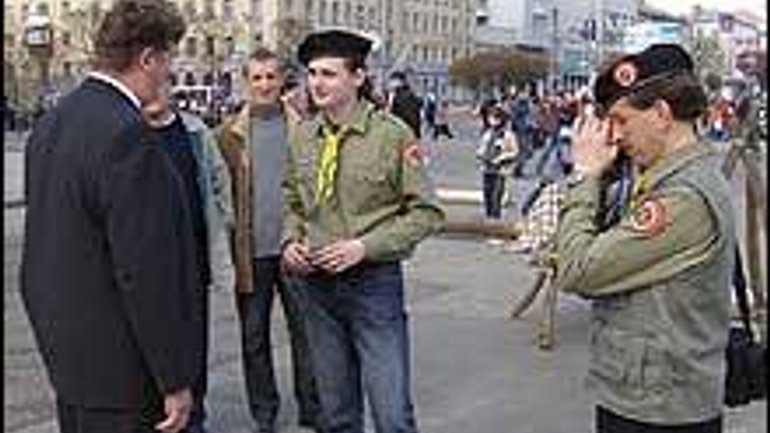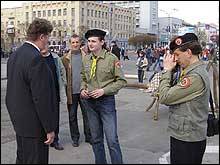Royal Rangers in Ukraine

 Oleksandr PYVOVARSKYI tells about the Royal Rangers scout movement, active at an Evangelical church in central Ukrainian Zhytomyr.
Oleksandr PYVOVARSKYI tells about the Royal Rangers scout movement, active at an Evangelical church in central Ukrainian Zhytomyr.
In the modern conditions of globalization and the openness of Ukrainian society, the Christian churches have found themselves confronted by such phenomena as drug addiction, alcoholism, and homeless children. A considerable part of teenagers find real homes in computer clubs, where the youth spend all their free time in front of the screen. The postmodern age and maybe also this situation have preconditioned the rise of new trends in the social ministry of the Christian churches. They assume the most diverse forms, which provokes the interest of teenagers and youth.
For quite some time, a little-known Christian organization of teenagers and youth, the Royal Rangers, has been run by the Testament of Jesus Christ Church of Christians of the Evangelical Faith in Zhytomyr.
The history of this organization began in 1961 in the USA as a program of ministry for boys in an Evangelical church. Since 1981, the ministry of the Royal Rangers has been active in Germany. In the course of time, similar children and youth ministries spread throughout all Europe. In 1991, the first mass gathering (European camp) of adherents of the organization was held. Since that time it has been held every four years. It is a good opportunity to share ideas and consolidate relations between churches of various Christian denominations.
In 1999 this Christian ministry reached Ukraine. Several young people were trained, received certificates, and started work in towns of Ukraine. Today in Ukraine, there are about 10 groups of Royal Rangers in various towns of the country. The center of the organization is situated in the town of Sloviansk, in eastern Ukraine’s Donetsk Region.
What is interesting about this organization? Its structure is clear and consists of groups. There is quite a range of ranks: commanders, leaders, junior leaders, assistant guides, group master, pioneer. Members of the organization have their uniform, emblem, flag.
The goal of the organization is the harmonious spiritual and physical development of the child, Christian education. The Rangers organize tours and participate in various sports. I would like to draw the reader’s attention to the fact that, before starting a hike, the participants learn to give first aid, tie knots, build tents, and so on. The word “Royal” signifies allegiance to God (the King), and a “Ranger” is one who voluntarily fulfills a task committed to him. For teenagers, it means allegiance to King Jesus Christ and following the fascinating way of discipleship under his guidance.
The organization begins its activity with the pastor’s blessing.
The program Royal Rangers is intended for 11 years. It is so designed that, in addition to the “prevention” activity (against drug addiction, alcoholism, and an immoral way of life), it provides preparation for all areas of life and provides practical advice for various life situations and promotes development of talents. This efficient program helps one to apply knowledge in real life. It is actually a continuation of the work of the Sunday school in church.
The Zhytomyr group, headed by Dmytro Rudyshyn and Ivan Bezruchuk, includes 8 adults and 45 children so far. However, they have considerable plans, including cleaning up garbage near an open-air museum, helping the lonely and disabled, and neighborhood work with troubled teenagers. There is even an original entrance test: a child has to help a lonely person for two months. This all recalls the long-forgotten Soviet Young Pioneers movement, but implemented in a Christian context. Two tours are already planned for the summer. The members attended the national convention of Royal Rangers.
It is worth noting that the organization is run exclusively on the donations of benefactors and church funds.
The original of this text was posted on RISU’s Ukrainian-language site on 24 May 2006.









